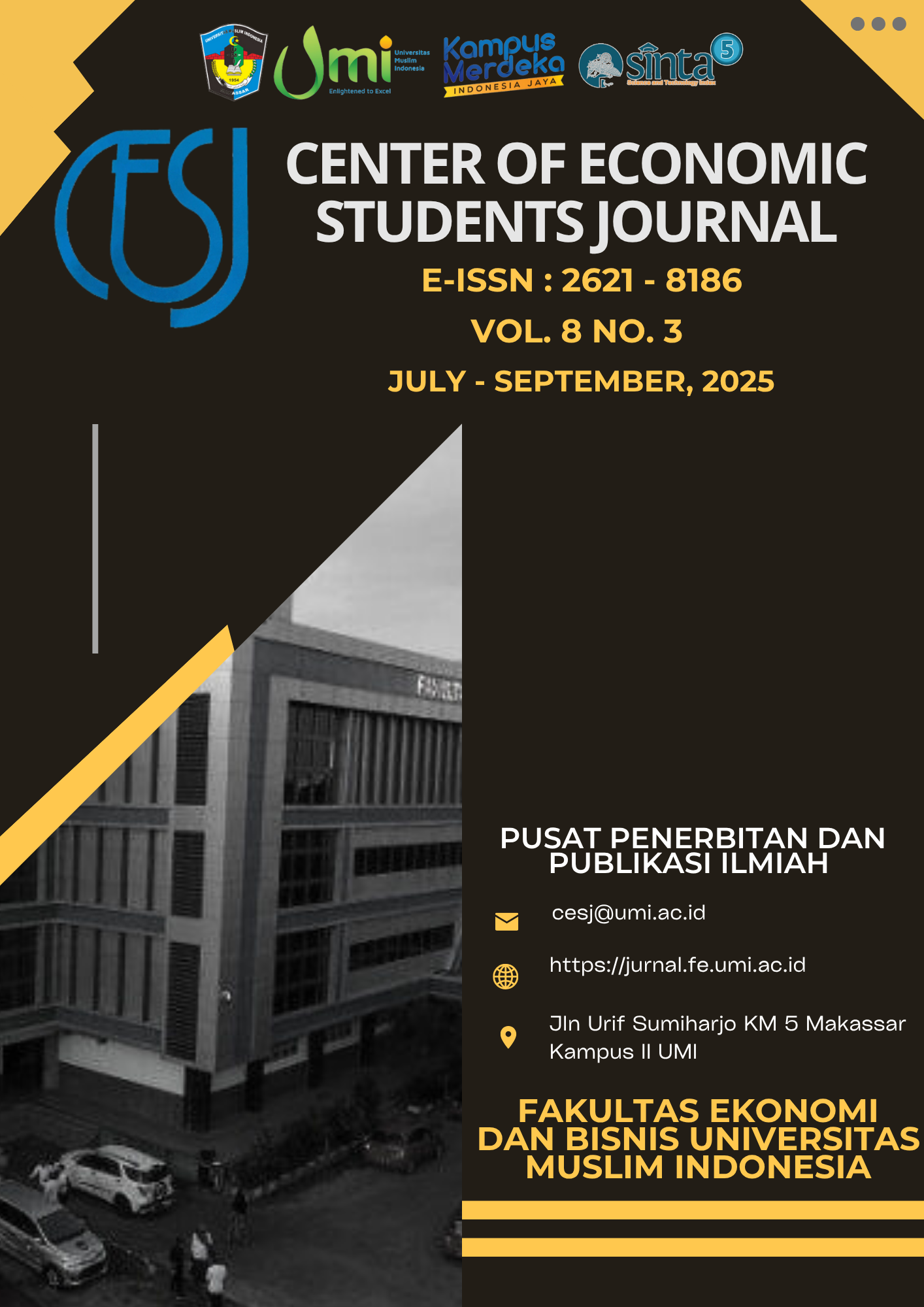Islamic Work Ethics affect the employee Performance; case study of several universities in Indonesia
DOI:
https://doi.org/10.56750/k5c6ss39Keywords:
Islamic Work Ethics, Employee Performance, Islamic UniversitiesAbstract
Islamic Work Ethics (IWE) play a central role in shaping organizational culture, particularly within Islamic-based higher education institutions. The integration of Islamic ethical principles such as honesty, fairness, healthy competition, and mutual assistance is expected to enhance employee performance and contribute to the achievement of institutional goals. While studies on work ethics have been widely conducted, research specifically focusing on IWE within the context of Islamic universities in Indonesia remains limited. This study aims to examine the effect of IWE on employee performance in several Islamic universities in East Java, namely Universitas Islam Malang (UNISMA), Universitas Islam Negeri (UIN), and Universitas Muhammadiyah Malang (UMM). The research employed a quantitative approach supported by qualitative insights. Data were collected through questionnaires and semi-structured interviews with permanent staff members of the three universities. The analysis revealed that IWE has a significant positive effect on employee performance. Employees who embraced values of Islamic ethics, particularly those emphasizing healthy competition and mutual help, demonstrated higher levels of productivity, discipline, and collaborative behavior. Interviews further supported these findings, with respondents acknowledging that Islamic values foster a sense of responsibility, solidarity, and motivation to contribute positively to the organization. The results confirm that IWE is an important determinant of employee performance in Islamic universities. By embedding ethical principles into workplace practices, institutions can strengthen human resource quality and align organizational goals with Islamic values. This study contributes to the growing body of literature on Islamic ethics in management and highlights the need for future research that explores broader cultural and institutional contexts. Expanding the scope of research to include different regions and employing longitudinal approaches would provide deeper insights into the long-term impact of IWE on organizational sustainability.
References
Abbasi, A. (2013). The impact of Islamic work ethics on employee performance: Testing two models of personality X and personality Y.
Abbas, M. A., & Kowang, T. O. (2020). Impact of ethical leadership and Islamic work ethics on employee commitment and job satisfaction. Journal of Research in Psychology, 2(2), 47–58. https://doi.org/10.31580/jrp.v2i2.1601
Ali, A., & Al-Owaihan, A. (2008). Islamic work ethic: A critical review. Cross Cultural Management: An International Journal, 15(1), 5–19. https://doi.org/10.1108/13527600810848791
Chanzanagh, H. E., & Akbarnejad, M. (2011). The meaning and dimensions of Islamic work ethic: Initial validation of a multidimensional IWE in Iranian society. Procedia - Social and Behavioral Sciences, 30, 916–924. https://doi.org/10.1016/j.sbspro.2011.10.178
Haroon, E., Raison, C. L., & Miller, A. H. (2012). Psychoneuroimmunology meets neuropsychopharmacology: Translational implications of the impact of inflammation on behavior. Neuropsychopharmacology, 37(1), 137–162. https://doi.org/10.1038/npp.2011.205
Hayati, K., & Caniago, I. (2012). Islamic work ethic: The role of intrinsic motivation, job satisfaction, organizational commitment and job performance. Procedia - Social and Behavioral Sciences, 65, 272–277. https://doi.org/10.1016/j.sbspro.2012.11.122
Kurniati, K., Basalamah, S., Halim, A., & Syahid, A. (2021). The effect of Islamic work ethic, competence and motivation on the performance of state Madrasah Aliyah teachers in South Sulawesi. Jurnal Diskursus Islam, 9(3), 368. https://doi.org/10.24252/jdi.v9i3.21451
Mahfoudh, A., Salleh, M., & Din, H. (2017). Contemporary issues and development in the global halal industry. In Contemporary issues and development in the global halal industry (pp. 381–390). Springer. https://doi.org/10.1007/978-981-10-1452-9
Murtaza, G., Abbas, M., Raja, U., Roques, O., Khalid, A., & Mushtaq, R. (2016). Impact of Islamic work ethics on organizational citizenship behaviors and knowledge-sharing behaviors. Journal of Business Ethics, 133(2), 325–333. https://doi.org/10.1007/s10551-014-2396-0
Nasution, F. N., & Rafiki, A. (2020). Islamic work ethics, organizational commitment and job satisfaction of Islamic banks in Indonesia. RAUSP Management Journal, 55(2), 195–205. https://doi.org/10.1108/RAUSP-01-2019-0011
Norhasniah, W., & Wan Husin, W. N. (2012). Work ethics from the Islamic perspective in Malaysia. European Journal of Social Science, 29(1).
Qasim, M., Irshad, M., Majeed, M., & Rizvi, S. T. H. (2021). Examining impact of Islamic work ethic on task performance: Mediating effect of psychological capital and a moderating role of ethical leadership. Journal of Business Ethics. https://doi.org/10.1007/s10551-021-04916-y
Ridwan. (2019). Pemberdayaan etos kerja masyarakat dalam perspektif Al-Qur’an. Al-Munzir: Jurnal Ilmu Komunikasi dan Penyiaran Islam. https://doi.org/10.15548/amj-kpi.v0i0.1265
Rokhman, W. (2010). The effect of Islamic work ethics on work outcomes. Electronic Journal of Business Ethics and Organization Studies, 15(1).
Rose, R. (2010). Examining the link between Islamic work ethic and innovation capability. Journal of Management Development, 29(1), 79–93. https://doi.org/10.1108/02621711011009081
Salahudin, S. N. bin, Baharuddin, S. S. binti, Abdullah, M. S., & Osman, A. (2016). The effect of Islamic work ethics on organizational commitment. Procedia Economics and Finance, 35, 582–590. https://doi.org/10.1016/S2212-5671(16)00071-X
Sami, F. A.-Z., & Abdul Rahim, A. (2017). Ethics & values in construction industry from Islamic perspective. Planning Malaysia, 15(1), 1–12. https://doi.org/10.21837/pm.v15i1.248
Siddiqui, N., Hameed, S., Sattar, R., & Eneizan, B. (2019). Islamic work ethics impact on employee performance. [Conference Paper], 1–7.
Sodiq, A. (2018). Pengaruh etika kerja Islam, kepemimpinan transformasional dan motivasi kerja terhadap kinerja karyawan di KJKS BMT Logam Mulia Grobogan. BISNIS: Jurnal Bisnis dan Manajemen Islam, 6(1), 118. https://doi.org/10.21043/bisnis.v6i1.3700
Sudarmanto, G. (2014). Teologi multikultural (D. E. Latumahina, Ed.; 1st ed.). Multi-Media YPPII Batu.
Syarif, A., Rahmawati, A., & Fasa, M. (2019). The effect of Islamic work ethic and productivity on work quality through employee performance. Review of Islamic Economics and Finance, 2(1), 40–52. https://doi.org/10.17509/rief.v2i1.22375
Ulman, Y. (2015). Social ethics. [Conference Paper], 1–11.
Usman, M. (2017). Islamic work ethic and public sector innovation: Entrepreneurial orientation as a moderator. International Journal of Business and Technopreneurship, 7(2), 203–212.
Wijaya, T. (2013). Metodologi penelitian ekonomi dan bisnis teori dan praktik.
Downloads
Published
Issue
Section
License
Copyright (c) 2025 CESJ : Center of Economic Students Journal

This work is licensed under a Creative Commons Attribution 4.0 International License.








